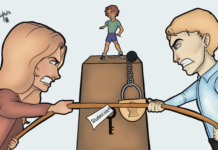
With student protests sweeping across universities nationwide, the 2023-2024 academic year has been characterized by youth activism as students advocate for important social justice issues. From the 1960s Vietnam War protests to the 1980s Anti-Apartheid Movement, college campuses have historically been spaces where youth-led civil disobedience occurs. However, there has been an undeniable growth in the scope and intensity of student protests this academic year, reflecting Generation Z’s (Gen Z) fresh perspective on social justice issues and the development of unique ways to advocate for them.
In February, the University of California, Riverside’s (UCR) chapter of Young Democratic Socialists of America (YDSA) circulated a petition demanding the university administration end its licensing agreement with Starbucks. More than 780 students signed the petition in protest of the company’s practice of union-busting and violating workers’ rights.
In the same week, Providing Opportunities, Dreams and Education in Riverside (PODER) dropped a banner at the Highlander Union Building and held on-campus vigils near the Bell Tower to protest the UC Regents suspension of Policy 4407, a plan that would have allowed undocumented students to work legally at UC campuses.
However, the impact of student activism at UCR was most pronounced when Students for Justice in Palestine (SJP) established an encampment and led protests on campus for a week to stand in solidarity with Palestinians, urging for a ceasefire in Gaza and pushing university administration to divest from companies doing business with Israel. Their successful negotiation of an agreement with UCR administration — the first in the UC system — demonstrated student collective action’s power and youth activism’s importance.
All of the protests at UCR result from strong collaboration and partnerships between dedicated students who feel passionately about addressing social justice issues on campus. Gen Z’s collective voice is strengthened by its diversity, which, according to a Pew Research Center study, is the most ‘racially and ethnically’ diverse generation ever. Gen Z students understand minority experiences profoundly and, therefore, have a stronger stance on issues of equity and inclusivity.
This is especially true at UCR, one of the most diverse UC campuses in the 10-campus system. According to the Office of Diversity, Equity and Inclusion, 41.5% of students are Latinx and 51% are first-generation. Thus, UCR students are empathic about social justice issues — especially those affecting minority groups — spurring them to protest a growing list of social injustices.
In addition to utilizing traditional protest methods, Gen Z has also successfully used the 21st-century protest tactics of social media. In 2020, for example, teen TikTok users registered for hundreds of thousands of tickets at Donald Trump’s presidential rally in Tulsa, Oklahoma. Believing the rally would be a sold-out crowd, Trump was confused when he was greeted with rows and rows of empty seats. Using this new popular social media platform, Gen Z users were able to quickly spread the word about their efforts and rack up millions of views. They also strategically deleted their posts “after 24 to 48 hours” to conceal their plans from mainstream media.
Gen Z users also reclaimed the #WhiteLivesMatter on social media by spamming the hashtag with K-pop videos of their favorite stars, making it more difficult for white supremacists to communicate with each other. Despite being maligned as a “technology-dependent” generation, Gen Z is using their knowledge about social media as a tool to disseminate and communicate information about protests globally. UCR’s SJP, for example, effectively used Instagram videos of cheering students to announce its agreement with the campus administration which gained thousands of views.
From climate change to gun violence to economic insecurity, members of Gen Z have inherited a host of problems they didn’t create but are determined to address. The desire to fight for the issues they care about is at the root of today’s student activism and explains the intensity of the protests, with many even willing to put their lives on the line. This past January, for example, a group of UC students led a hunger strike to push the UC Regents to accept Policy 4407. Additionally, at the University of California, Los Angeles, pro-Palestinian student protestors were shot with rubber bullets by police, sprayed with pepper and tear gas by pro-Israel protestors and hospitalized for injuries.
As the 2023-2024 academic year ends and many student activist leaders graduate, a new group of Gen Z students must step up to continue the fight. The challenges ahead are unclear; however, the past year’s events at UCR have shown that student activism is alive and well on this campus and can create meaningful change.








